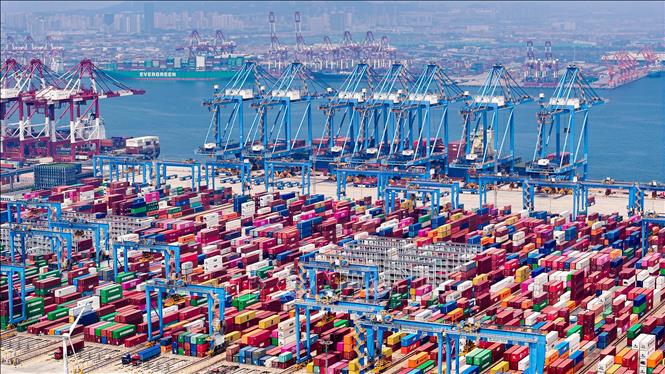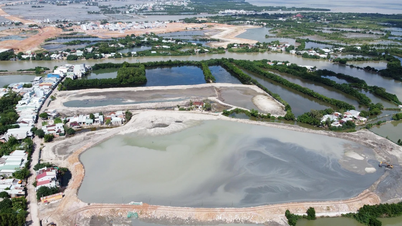The rise of populism, trade protectionism and political instability in many countries pose major challenges to economic growth and stability in 2024.
However, the world economy still shows remarkable resilience. In 2025, the world economy is forecast to enter a new era, with more complex and unpredictable factors. Amidst the "wave" of these challenges and difficulties, major economies such as the US, the European Union (EU) and China are constantly adjusting their economic strategies to protect national interests. Not out of this trend, Vietnam is promoting transformation in manufacturing industries, to become an important link in the global supply chain.
To have a more general perspective on the above issues, the global economic picture in general and the Vietnamese economy in particular, the Economic News Editorial Board respectfully introduces a series of 5 articles titled "Growth prospects from a volatile world".
Lesson 1: Political race and world economic destiny
2024 is a "super election" year, with about 60 countries and territories holding important elections, directly affecting the global political and economic situation. From the US and European Parliament elections to elections in major and emerging economies such as Russia, India, the UK, Japan, Indonesia, Mexico, etc., political changes pose new challenges to the stability and growth of the world economy in the coming time, especially in the post-COVID-19 pandemic context, increasing geopolitical tensions and high inflation.
The rise of populism could slow growth
Populism is on the rise globally. According to a study published in September 2024 by the International Democratic Institute (NDI), support for populist parties has risen by double digits in many countries, especially in Europe and Latin America. This rise has led to major shifts in economic policy. The trend is particularly pronounced in Europe, where political deadlock in France and the discrediting of the German coalition government - the two economic pillars of the European Union (EU) - have hampered reforms needed to boost growth.
In Asia, Prime Minister Narendra Modi’s landslide victory in India further confirmed his political and economic achievements over the past 10 years. Meanwhile, in Indonesia, the leadership change is expected to have a major impact on mining policy, leading to uncertainty for foreign investors in the nickel sector, which contributes 2% to the country’s gross domestic product (GDP).
US election and the risk of a new trade war
The US presidential election is one of the most closely watched events in 2024, as changes in the new administration's economic and trade policies will affect not only the US economy but also the global economy. Therefore, right from the election campaign, the policy statements of the two candidates Donald Trump of the Republican Party and Vice President Kamala Harris of the Democratic Party have caused global stock markets to experience record increases and decreases, while the price of gold - investors' favorite risk-off asset - continuously reached new peaks.
If President-elect Donald Trump implements the policy proposals he made during his campaign, especially his tariff policies, the impact on the world economy and global markets is expected to be quite profound. The International Monetary Fund (IMF) also recently warned that the trade war, especially between the US and China, could cause great damage to the world economy, especially in Asia, the region that accounts for 60% of global economic growth.
President-elect Trump has threatened to raise tariffs on imported goods from other countries such as Canada, Mexico, China... According to a joint analysis by expert Wendy Edelberg of the Brookings Institution and expert Maurice Obstfeld of the Peterson Institute for International Economics, such a move, if implemented, would cause chaos for business operations not only for partners exporting goods to the US, but also affect consumers and the US economy.
Bloomberg Economics predicts that if China retaliates by imposing tariffs, US GDP could fall by 0.8% by 2028. And then Europe will also face heavy losses if Chinese goods flood into the bloc's market due to the US's new tariff policy.
Global economy resilient amid storms
Despite major political challenges, the global economy is expected to show resilience in 2024. Global inflation is expected to decline to 2.8% by the end of this year, significantly lower than 4% in 2023, supporting household spending.
In the World Economic Outlook report, published in October 2024, experts from the International Monetary Fund (IMF) stated that the growth gap between economies is gradually narrowing compared to the beginning of 2024 and economic activity continues to recover. The IMF forecasts global economic growth in 2024 at 3.2%, unchanged from the forecast made in July 2024.
Similarly, the latest world economic outlook reports from international organizations, such as the Organization for Economic Cooperation and Development (OECD), the United Nations (UN), the Asian Development Bank (ADB), and Fitch Ratings, all give optimistic figures, but most of them are lower than the IMF's forecast.
The US remains the main "bright spot", despite slowing growth in the third quarter of 2024. Carsten Brzeski, chief economist at ING Group, said that Donald Trump's second term would bring good news for the US economy in the short term. Tax cuts and deregulation, at least in the near term, would boost growth for the US economy. However, some experts said that the US economic outlook for the next four years under President Trump's leadership would be both bright and dark, if Trump decides to push ahead with the tariff war.
In China, domestic consumption is showing signs of recovery, but the stagnation of the real estate and financial sectors is still having a significant impact on economic growth. The IMF forecasts China's economic growth to reach 4.8% for the whole of 2024, 0.2% lower than the government's target.
The EU economy is showing signs of recovery, with growth estimated at 1.5% for the full year of 2024. Meanwhile, India is emerging as a “bright star” with an expected growth rate of 7%. Emerging markets and developing economies also have stable growth prospects, around 4.2% for the full year of 2024.
However, Japan faces the risk of negative growth of 0.2%. This is due to temporary supply disruptions related to the closure of a major auto plant in early 2024 and political turmoil in the final months of this year.
Many challenges await in 2025
Looking ahead to 2025, the global economic picture is expected to continue to be strongly influenced by political upheavals from 2024. Uncertainty over US trade policy, coupled with simmering geopolitical tensions, could pose significant risks to global growth.
Elections, populism, geopolitical tensions, and the legacy of the COVID-19 pandemic will continue to have a strong impact on the global economic landscape. The economic recovery remains fragile and vulnerable to unexpected shocks. Enhanced international cooperation, promoting free trade and multilateralism, and flexible and adaptive economic policies will be key to overcoming these challenges and moving towards a more stable and sustainable economic future.
Lesson 2: Factors shaping the new era
According to VNA
Source: https://doanhnghiepvn.vn/kinh-te/trien-vong-tang-truong-tu-mot-the-gioi-bien-dong-bai-1-cuoc-dua-chinh-tri-va-van-menh-kinh-te-toan-cau/20241205090816072



![[Photo] Prime Minister Pham Minh Chinh meets with the Policy Advisory Council on Private Economic Development](https://vphoto.vietnam.vn/thumb/1200x675/vietnam/resource/IMAGE/2025/5/8/387da60b85cc489ab2aed8442fc3b14a)

![[Photo] General Secretary concludes visit to Azerbaijan, departs for visit to Russian Federation](https://vphoto.vietnam.vn/thumb/1200x675/vietnam/resource/IMAGE/2025/5/8/7a135ad280314b66917ad278ce0e26fa)

![[Photo] President Luong Cuong presents the decision to appoint Deputy Head of the Office of the President](https://vphoto.vietnam.vn/thumb/1200x675/vietnam/resource/IMAGE/2025/5/8/501f8ee192f3476ab9f7579c57b423ad)
![[Photo] National Assembly Chairman Tran Thanh Man chairs the meeting of the Subcommittee on Documents of the First National Assembly Party Congress](https://vphoto.vietnam.vn/thumb/1200x675/vietnam/resource/IMAGE/2025/5/8/72b19a73d94a4affab411fd8c87f4f8d)
























































![[Photo] Prime Minister Pham Minh Chinh talks on the phone with Singaporean Prime Minister Lawrence Wong](https://vphoto.vietnam.vn/thumb/402x226/vietnam/resource/IMAGE/2025/5/8/e2eab082d9bc4fc4a360b28fa0ab94de)


































Comment (0)